Legal Aspects of Business: Company Structures and Director Duties
VerifiedAdded on 2019/12/28
|11
|3890
|344
Report
AI Summary
This report delves into the legal aspects of business, providing a detailed analysis of different company structures, including sole traders, unlimited partnerships, and limited liability partnerships (LLPs). It explores the key distinctions between these structures, outlining the liabilities and legal frameworks that govern them. The report further examines the roles and responsibilities of company directors, specifically focusing on their duties, such as acting within their powers, promoting the success of the company, exercising independent judgment, and avoiding conflicts of interest. Case studies and examples are provided to illustrate these concepts, offering insights into the practical implications of legal compliance and ethical conduct in the business environment. The report also discusses relevant legal principles and regulations, emphasizing the importance of adherence to the law for the sustainable operation and success of any business.
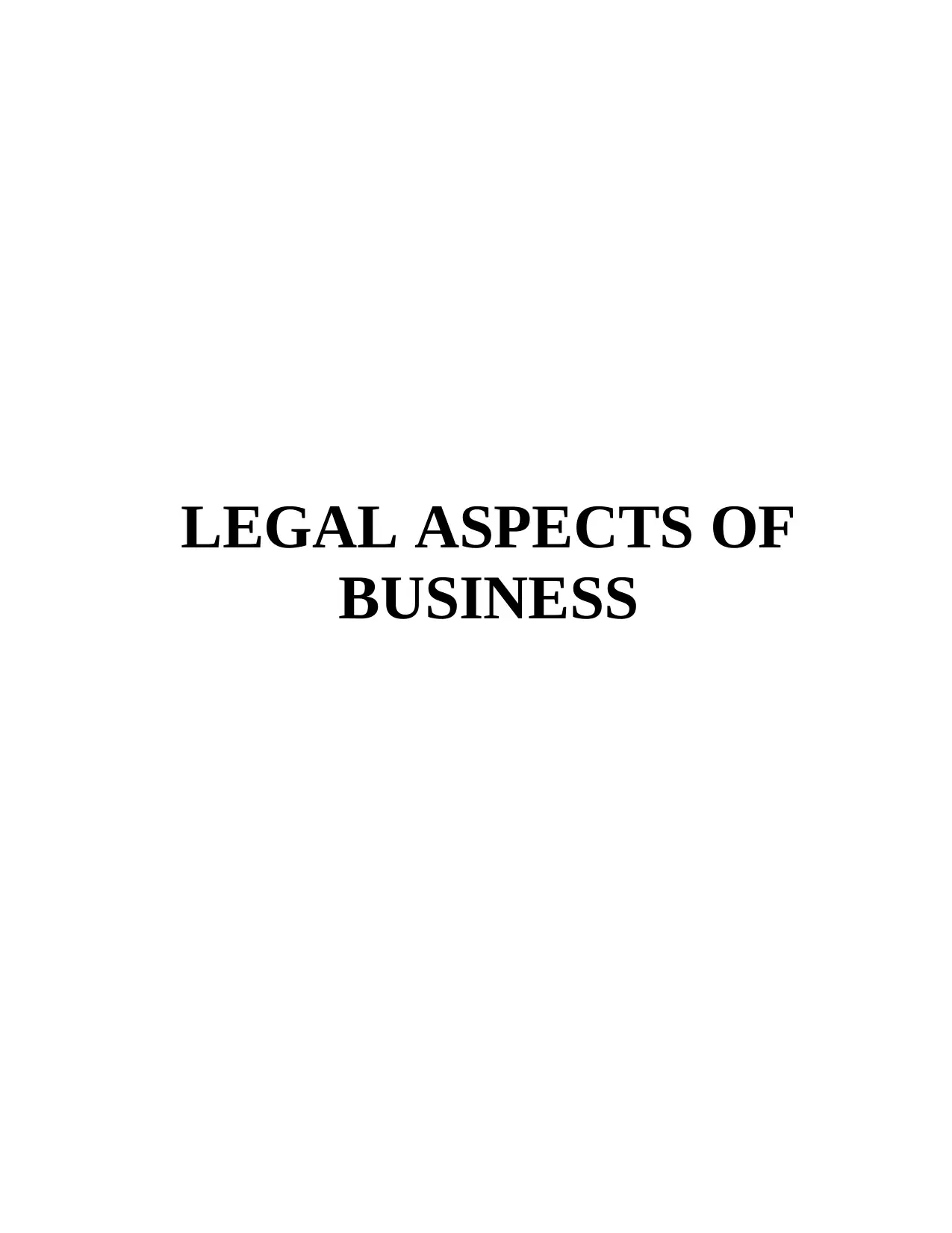
LEGAL ASPECTS OF
BUSINESS
BUSINESS
Paraphrase This Document
Need a fresh take? Get an instant paraphrase of this document with our AI Paraphraser
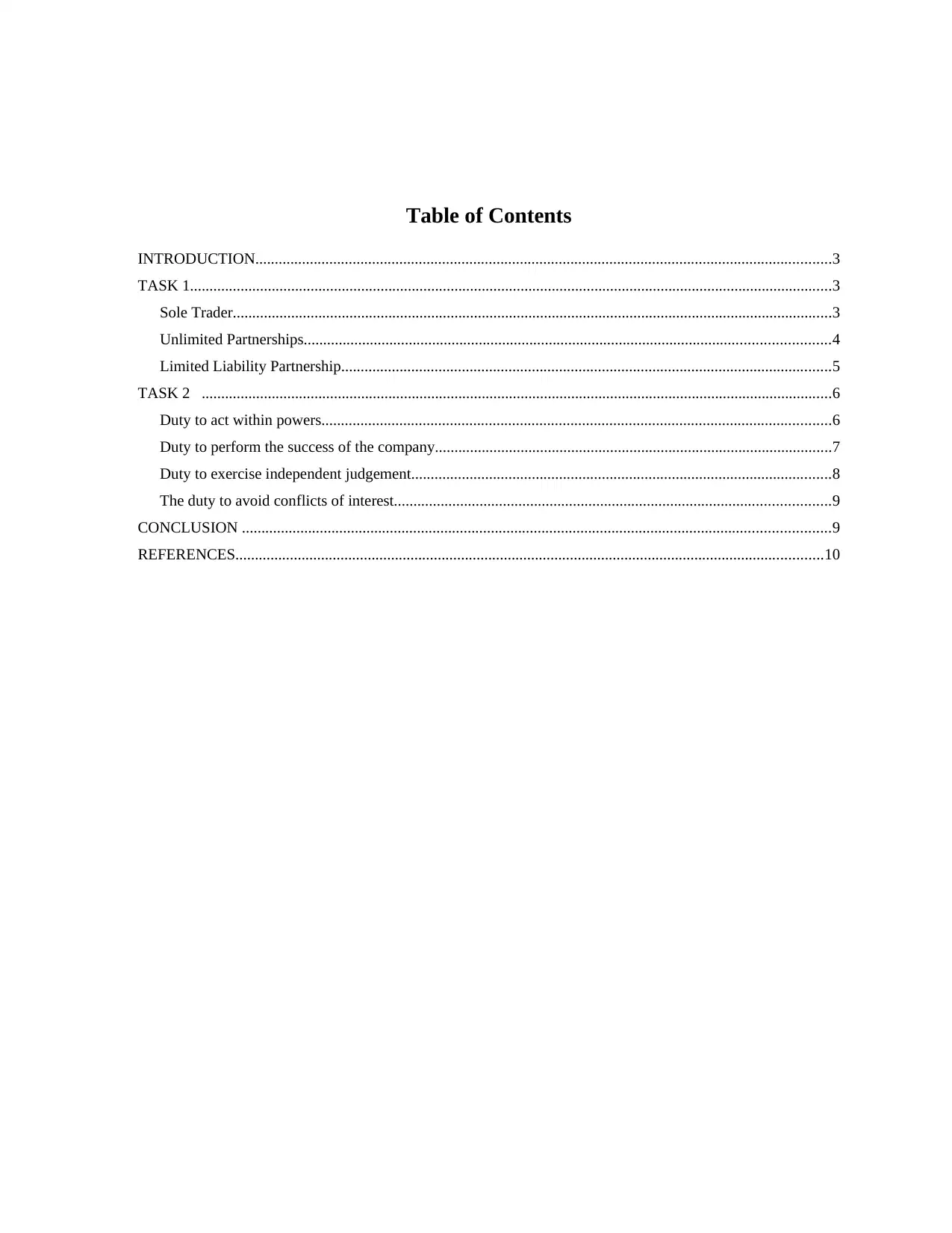
Table of Contents
INTRODUCTION....................................................................................................................................................3
TASK 1.....................................................................................................................................................................3
Sole Trader..........................................................................................................................................................3
Unlimited Partnerships.......................................................................................................................................4
Limited Liability Partnership..............................................................................................................................5
TASK 2 ..................................................................................................................................................................6
Duty to act within powers...................................................................................................................................6
Duty to perform the success of the company......................................................................................................7
Duty to exercise independent judgement............................................................................................................8
The duty to avoid conflicts of interest................................................................................................................9
CONCLUSION .......................................................................................................................................................9
REFERENCES.......................................................................................................................................................10
INTRODUCTION....................................................................................................................................................3
TASK 1.....................................................................................................................................................................3
Sole Trader..........................................................................................................................................................3
Unlimited Partnerships.......................................................................................................................................4
Limited Liability Partnership..............................................................................................................................5
TASK 2 ..................................................................................................................................................................6
Duty to act within powers...................................................................................................................................6
Duty to perform the success of the company......................................................................................................7
Duty to exercise independent judgement............................................................................................................8
The duty to avoid conflicts of interest................................................................................................................9
CONCLUSION .......................................................................................................................................................9
REFERENCES.......................................................................................................................................................10
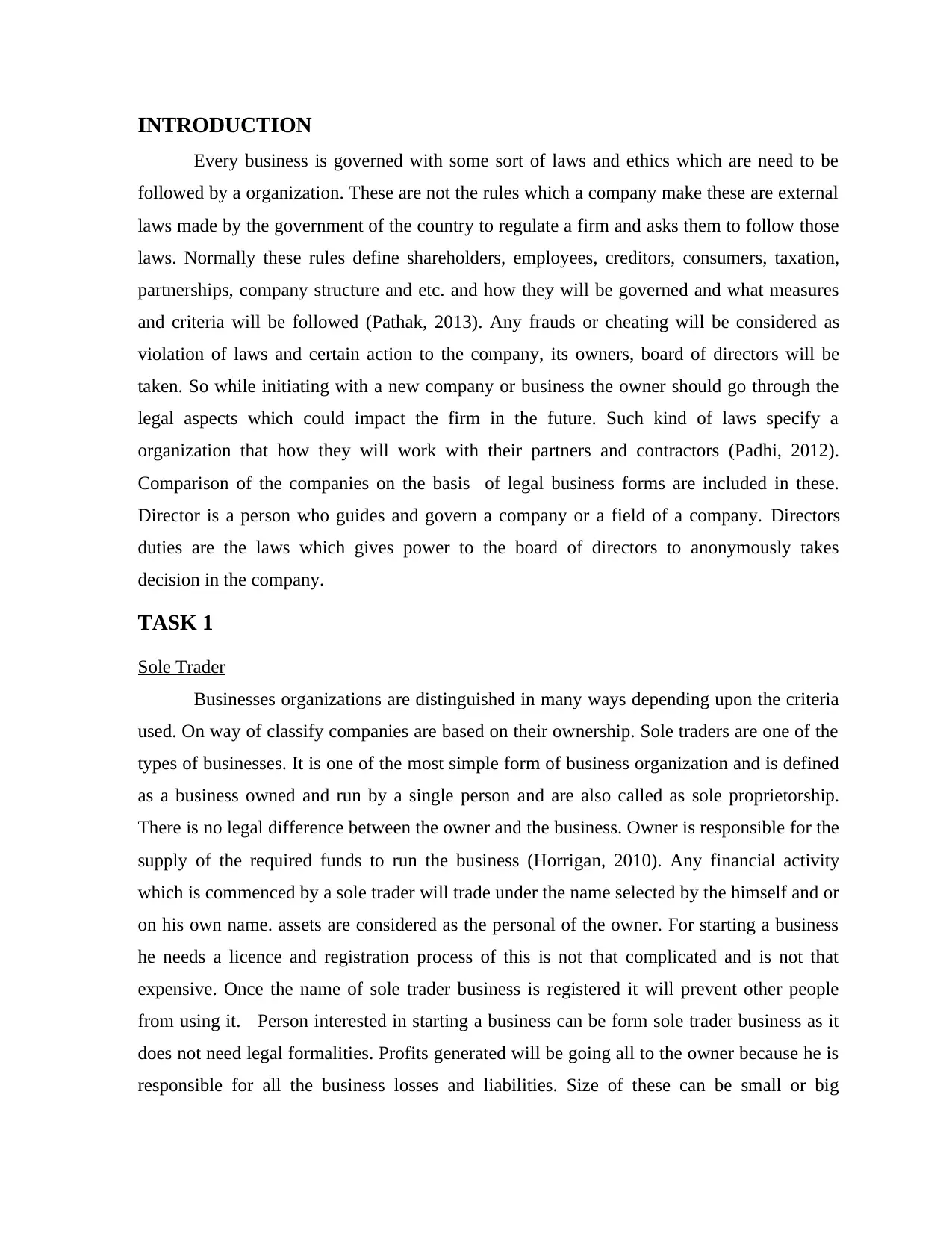
INTRODUCTION
Every business is governed with some sort of laws and ethics which are need to be
followed by a organization. These are not the rules which a company make these are external
laws made by the government of the country to regulate a firm and asks them to follow those
laws. Normally these rules define shareholders, employees, creditors, consumers, taxation,
partnerships, company structure and etc. and how they will be governed and what measures
and criteria will be followed (Pathak, 2013). Any frauds or cheating will be considered as
violation of laws and certain action to the company, its owners, board of directors will be
taken. So while initiating with a new company or business the owner should go through the
legal aspects which could impact the firm in the future. Such kind of laws specify a
organization that how they will work with their partners and contractors (Padhi, 2012).
Comparison of the companies on the basis of legal business forms are included in these.
Director is a person who guides and govern a company or a field of a company. Directors
duties are the laws which gives power to the board of directors to anonymously takes
decision in the company.
TASK 1
Sole Trader
Businesses organizations are distinguished in many ways depending upon the criteria
used. On way of classify companies are based on their ownership. Sole traders are one of the
types of businesses. It is one of the most simple form of business organization and is defined
as a business owned and run by a single person and are also called as sole proprietorship.
There is no legal difference between the owner and the business. Owner is responsible for the
supply of the required funds to run the business (Horrigan, 2010). Any financial activity
which is commenced by a sole trader will trade under the name selected by the himself and or
on his own name. assets are considered as the personal of the owner. For starting a business
he needs a licence and registration process of this is not that complicated and is not that
expensive. Once the name of sole trader business is registered it will prevent other people
from using it. Person interested in starting a business can be form sole trader business as it
does not need legal formalities. Profits generated will be going all to the owner because he is
responsible for all the business losses and liabilities. Size of these can be small or big
Every business is governed with some sort of laws and ethics which are need to be
followed by a organization. These are not the rules which a company make these are external
laws made by the government of the country to regulate a firm and asks them to follow those
laws. Normally these rules define shareholders, employees, creditors, consumers, taxation,
partnerships, company structure and etc. and how they will be governed and what measures
and criteria will be followed (Pathak, 2013). Any frauds or cheating will be considered as
violation of laws and certain action to the company, its owners, board of directors will be
taken. So while initiating with a new company or business the owner should go through the
legal aspects which could impact the firm in the future. Such kind of laws specify a
organization that how they will work with their partners and contractors (Padhi, 2012).
Comparison of the companies on the basis of legal business forms are included in these.
Director is a person who guides and govern a company or a field of a company. Directors
duties are the laws which gives power to the board of directors to anonymously takes
decision in the company.
TASK 1
Sole Trader
Businesses organizations are distinguished in many ways depending upon the criteria
used. On way of classify companies are based on their ownership. Sole traders are one of the
types of businesses. It is one of the most simple form of business organization and is defined
as a business owned and run by a single person and are also called as sole proprietorship.
There is no legal difference between the owner and the business. Owner is responsible for the
supply of the required funds to run the business (Horrigan, 2010). Any financial activity
which is commenced by a sole trader will trade under the name selected by the himself and or
on his own name. assets are considered as the personal of the owner. For starting a business
he needs a licence and registration process of this is not that complicated and is not that
expensive. Once the name of sole trader business is registered it will prevent other people
from using it. Person interested in starting a business can be form sole trader business as it
does not need legal formalities. Profits generated will be going all to the owner because he is
responsible for all the business losses and liabilities. Size of these can be small or big
⊘ This is a preview!⊘
Do you want full access?
Subscribe today to unlock all pages.

Trusted by 1+ million students worldwide
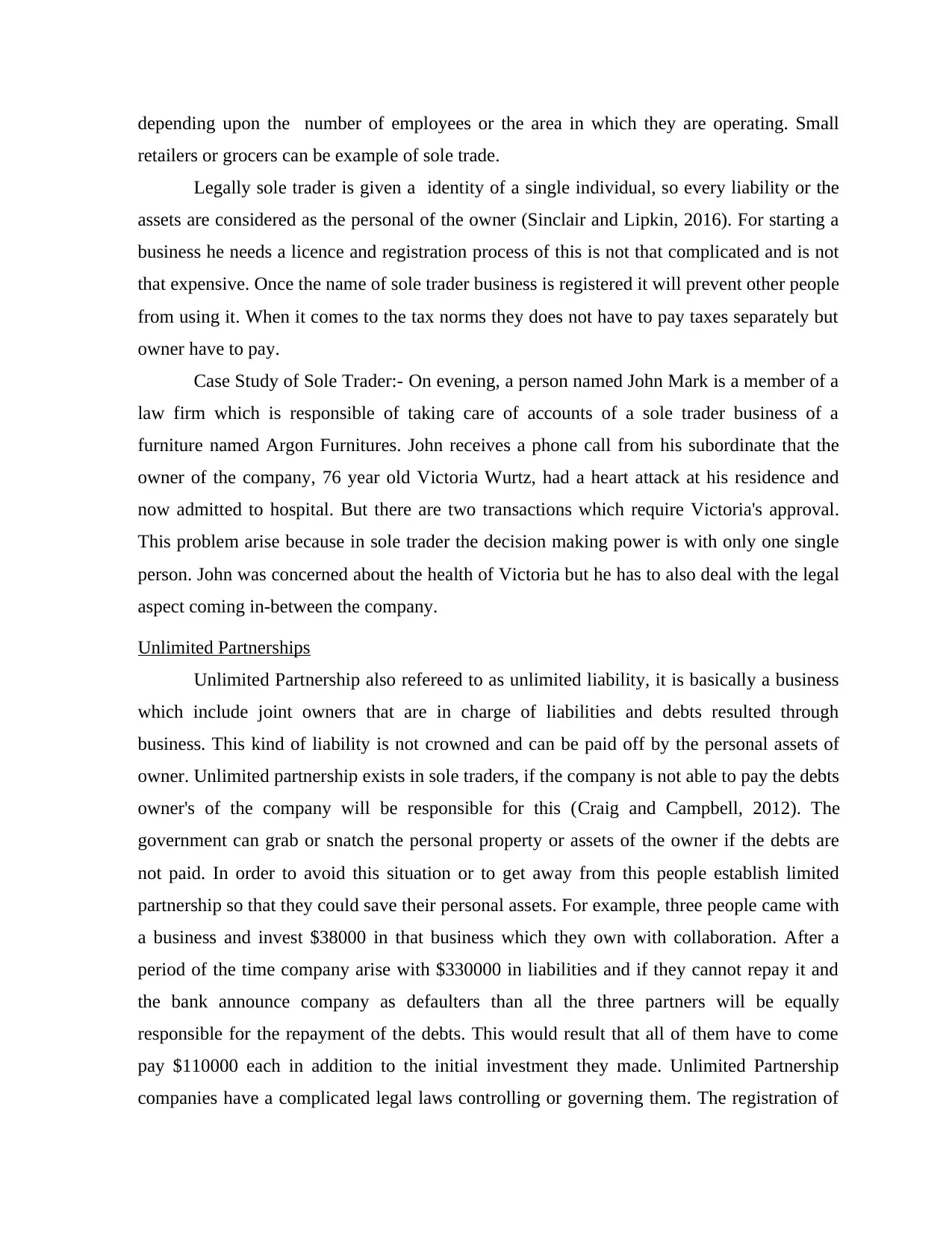
depending upon the number of employees or the area in which they are operating. Small
retailers or grocers can be example of sole trade.
Legally sole trader is given a identity of a single individual, so every liability or the
assets are considered as the personal of the owner (Sinclair and Lipkin, 2016). For starting a
business he needs a licence and registration process of this is not that complicated and is not
that expensive. Once the name of sole trader business is registered it will prevent other people
from using it. When it comes to the tax norms they does not have to pay taxes separately but
owner have to pay.
Case Study of Sole Trader:- On evening, a person named John Mark is a member of a
law firm which is responsible of taking care of accounts of a sole trader business of a
furniture named Argon Furnitures. John receives a phone call from his subordinate that the
owner of the company, 76 year old Victoria Wurtz, had a heart attack at his residence and
now admitted to hospital. But there are two transactions which require Victoria's approval.
This problem arise because in sole trader the decision making power is with only one single
person. John was concerned about the health of Victoria but he has to also deal with the legal
aspect coming in-between the company.
Unlimited Partnerships
Unlimited Partnership also refereed to as unlimited liability, it is basically a business
which include joint owners that are in charge of liabilities and debts resulted through
business. This kind of liability is not crowned and can be paid off by the personal assets of
owner. Unlimited partnership exists in sole traders, if the company is not able to pay the debts
owner's of the company will be responsible for this (Craig and Campbell, 2012). The
government can grab or snatch the personal property or assets of the owner if the debts are
not paid. In order to avoid this situation or to get away from this people establish limited
partnership so that they could save their personal assets. For example, three people came with
a business and invest $38000 in that business which they own with collaboration. After a
period of the time company arise with $330000 in liabilities and if they cannot repay it and
the bank announce company as defaulters than all the three partners will be equally
responsible for the repayment of the debts. This would result that all of them have to come
pay $110000 each in addition to the initial investment they made. Unlimited Partnership
companies have a complicated legal laws controlling or governing them. The registration of
retailers or grocers can be example of sole trade.
Legally sole trader is given a identity of a single individual, so every liability or the
assets are considered as the personal of the owner (Sinclair and Lipkin, 2016). For starting a
business he needs a licence and registration process of this is not that complicated and is not
that expensive. Once the name of sole trader business is registered it will prevent other people
from using it. When it comes to the tax norms they does not have to pay taxes separately but
owner have to pay.
Case Study of Sole Trader:- On evening, a person named John Mark is a member of a
law firm which is responsible of taking care of accounts of a sole trader business of a
furniture named Argon Furnitures. John receives a phone call from his subordinate that the
owner of the company, 76 year old Victoria Wurtz, had a heart attack at his residence and
now admitted to hospital. But there are two transactions which require Victoria's approval.
This problem arise because in sole trader the decision making power is with only one single
person. John was concerned about the health of Victoria but he has to also deal with the legal
aspect coming in-between the company.
Unlimited Partnerships
Unlimited Partnership also refereed to as unlimited liability, it is basically a business
which include joint owners that are in charge of liabilities and debts resulted through
business. This kind of liability is not crowned and can be paid off by the personal assets of
owner. Unlimited partnership exists in sole traders, if the company is not able to pay the debts
owner's of the company will be responsible for this (Craig and Campbell, 2012). The
government can grab or snatch the personal property or assets of the owner if the debts are
not paid. In order to avoid this situation or to get away from this people establish limited
partnership so that they could save their personal assets. For example, three people came with
a business and invest $38000 in that business which they own with collaboration. After a
period of the time company arise with $330000 in liabilities and if they cannot repay it and
the bank announce company as defaulters than all the three partners will be equally
responsible for the repayment of the debts. This would result that all of them have to come
pay $110000 each in addition to the initial investment they made. Unlimited Partnership
companies have a complicated legal laws controlling or governing them. The registration of
Paraphrase This Document
Need a fresh take? Get an instant paraphrase of this document with our AI Paraphraser
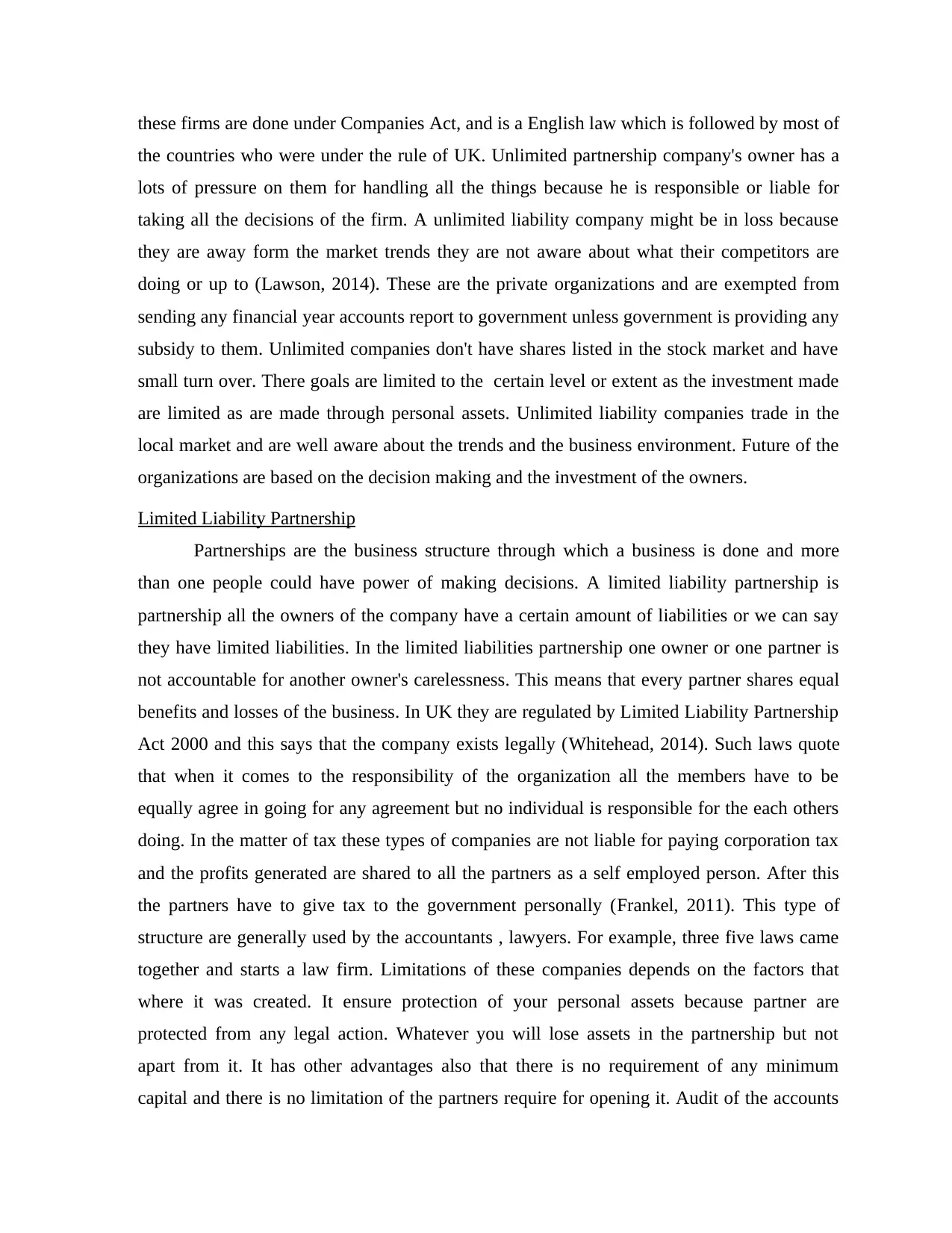
these firms are done under Companies Act, and is a English law which is followed by most of
the countries who were under the rule of UK. Unlimited partnership company's owner has a
lots of pressure on them for handling all the things because he is responsible or liable for
taking all the decisions of the firm. A unlimited liability company might be in loss because
they are away form the market trends they are not aware about what their competitors are
doing or up to (Lawson, 2014). These are the private organizations and are exempted from
sending any financial year accounts report to government unless government is providing any
subsidy to them. Unlimited companies don't have shares listed in the stock market and have
small turn over. There goals are limited to the certain level or extent as the investment made
are limited as are made through personal assets. Unlimited liability companies trade in the
local market and are well aware about the trends and the business environment. Future of the
organizations are based on the decision making and the investment of the owners.
Limited Liability Partnership
Partnerships are the business structure through which a business is done and more
than one people could have power of making decisions. A limited liability partnership is
partnership all the owners of the company have a certain amount of liabilities or we can say
they have limited liabilities. In the limited liabilities partnership one owner or one partner is
not accountable for another owner's carelessness. This means that every partner shares equal
benefits and losses of the business. In UK they are regulated by Limited Liability Partnership
Act 2000 and this says that the company exists legally (Whitehead, 2014). Such laws quote
that when it comes to the responsibility of the organization all the members have to be
equally agree in going for any agreement but no individual is responsible for the each others
doing. In the matter of tax these types of companies are not liable for paying corporation tax
and the profits generated are shared to all the partners as a self employed person. After this
the partners have to give tax to the government personally (Frankel, 2011). This type of
structure are generally used by the accountants , lawyers. For example, three five laws came
together and starts a law firm. Limitations of these companies depends on the factors that
where it was created. It ensure protection of your personal assets because partner are
protected from any legal action. Whatever you will lose assets in the partnership but not
apart from it. It has other advantages also that there is no requirement of any minimum
capital and there is no limitation of the partners require for opening it. Audit of the accounts
the countries who were under the rule of UK. Unlimited partnership company's owner has a
lots of pressure on them for handling all the things because he is responsible or liable for
taking all the decisions of the firm. A unlimited liability company might be in loss because
they are away form the market trends they are not aware about what their competitors are
doing or up to (Lawson, 2014). These are the private organizations and are exempted from
sending any financial year accounts report to government unless government is providing any
subsidy to them. Unlimited companies don't have shares listed in the stock market and have
small turn over. There goals are limited to the certain level or extent as the investment made
are limited as are made through personal assets. Unlimited liability companies trade in the
local market and are well aware about the trends and the business environment. Future of the
organizations are based on the decision making and the investment of the owners.
Limited Liability Partnership
Partnerships are the business structure through which a business is done and more
than one people could have power of making decisions. A limited liability partnership is
partnership all the owners of the company have a certain amount of liabilities or we can say
they have limited liabilities. In the limited liabilities partnership one owner or one partner is
not accountable for another owner's carelessness. This means that every partner shares equal
benefits and losses of the business. In UK they are regulated by Limited Liability Partnership
Act 2000 and this says that the company exists legally (Whitehead, 2014). Such laws quote
that when it comes to the responsibility of the organization all the members have to be
equally agree in going for any agreement but no individual is responsible for the each others
doing. In the matter of tax these types of companies are not liable for paying corporation tax
and the profits generated are shared to all the partners as a self employed person. After this
the partners have to give tax to the government personally (Frankel, 2011). This type of
structure are generally used by the accountants , lawyers. For example, three five laws came
together and starts a law firm. Limitations of these companies depends on the factors that
where it was created. It ensure protection of your personal assets because partner are
protected from any legal action. Whatever you will lose assets in the partnership but not
apart from it. It has other advantages also that there is no requirement of any minimum
capital and there is no limitation of the partners require for opening it. Audit of the accounts
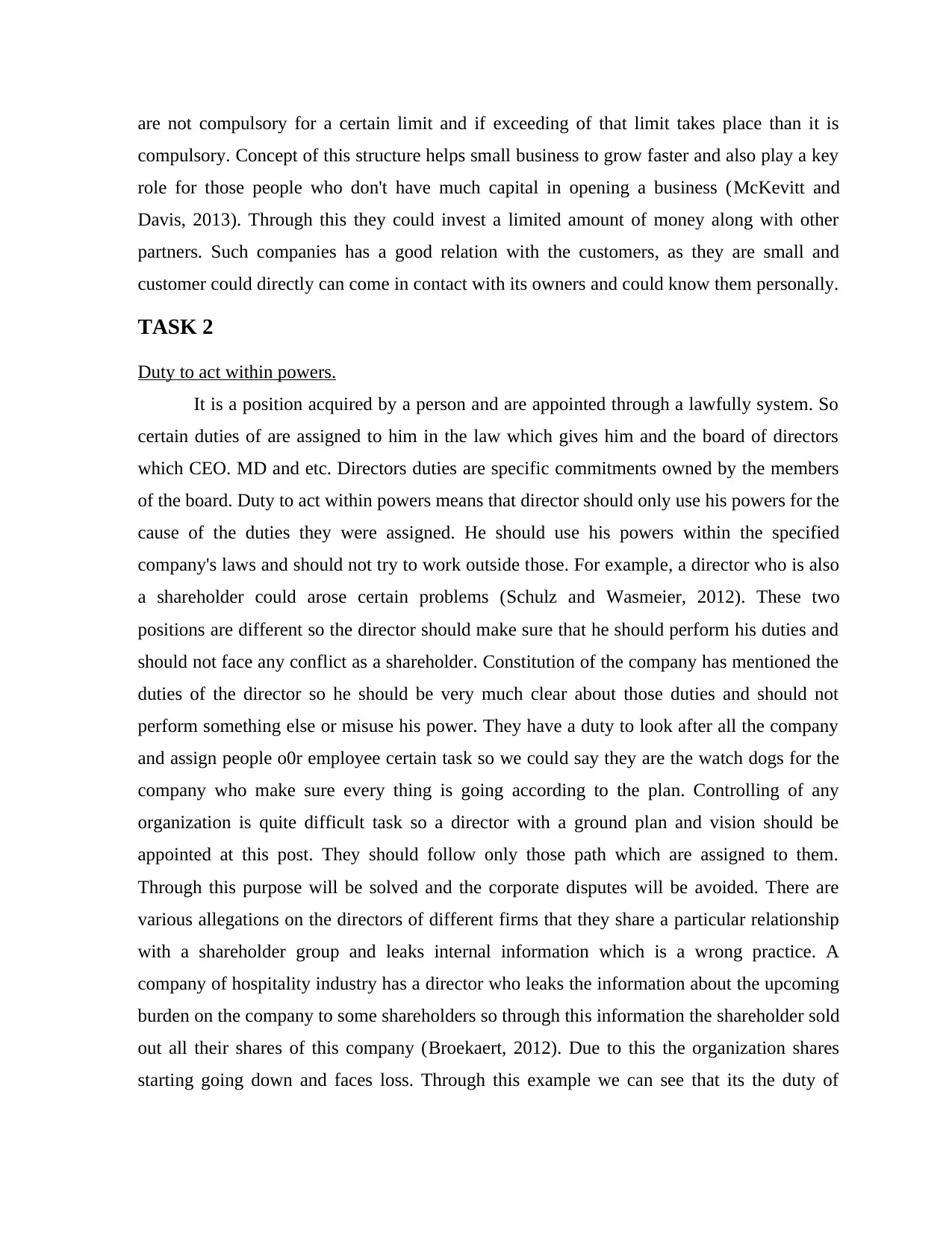
are not compulsory for a certain limit and if exceeding of that limit takes place than it is
compulsory. Concept of this structure helps small business to grow faster and also play a key
role for those people who don't have much capital in opening a business (McKevitt and
Davis, 2013). Through this they could invest a limited amount of money along with other
partners. Such companies has a good relation with the customers, as they are small and
customer could directly can come in contact with its owners and could know them personally.
TASK 2
Duty to act within powers.
It is a position acquired by a person and are appointed through a lawfully system. So
certain duties of are assigned to him in the law which gives him and the board of directors
which CEO. MD and etc. Directors duties are specific commitments owned by the members
of the board. Duty to act within powers means that director should only use his powers for the
cause of the duties they were assigned. He should use his powers within the specified
company's laws and should not try to work outside those. For example, a director who is also
a shareholder could arose certain problems (Schulz and Wasmeier, 2012). These two
positions are different so the director should make sure that he should perform his duties and
should not face any conflict as a shareholder. Constitution of the company has mentioned the
duties of the director so he should be very much clear about those duties and should not
perform something else or misuse his power. They have a duty to look after all the company
and assign people o0r employee certain task so we could say they are the watch dogs for the
company who make sure every thing is going according to the plan. Controlling of any
organization is quite difficult task so a director with a ground plan and vision should be
appointed at this post. They should follow only those path which are assigned to them.
Through this purpose will be solved and the corporate disputes will be avoided. There are
various allegations on the directors of different firms that they share a particular relationship
with a shareholder group and leaks internal information which is a wrong practice. A
company of hospitality industry has a director who leaks the information about the upcoming
burden on the company to some shareholders so through this information the shareholder sold
out all their shares of this company (Broekaert, 2012). Due to this the organization shares
starting going down and faces loss. Through this example we can see that its the duty of
compulsory. Concept of this structure helps small business to grow faster and also play a key
role for those people who don't have much capital in opening a business (McKevitt and
Davis, 2013). Through this they could invest a limited amount of money along with other
partners. Such companies has a good relation with the customers, as they are small and
customer could directly can come in contact with its owners and could know them personally.
TASK 2
Duty to act within powers.
It is a position acquired by a person and are appointed through a lawfully system. So
certain duties of are assigned to him in the law which gives him and the board of directors
which CEO. MD and etc. Directors duties are specific commitments owned by the members
of the board. Duty to act within powers means that director should only use his powers for the
cause of the duties they were assigned. He should use his powers within the specified
company's laws and should not try to work outside those. For example, a director who is also
a shareholder could arose certain problems (Schulz and Wasmeier, 2012). These two
positions are different so the director should make sure that he should perform his duties and
should not face any conflict as a shareholder. Constitution of the company has mentioned the
duties of the director so he should be very much clear about those duties and should not
perform something else or misuse his power. They have a duty to look after all the company
and assign people o0r employee certain task so we could say they are the watch dogs for the
company who make sure every thing is going according to the plan. Controlling of any
organization is quite difficult task so a director with a ground plan and vision should be
appointed at this post. They should follow only those path which are assigned to them.
Through this purpose will be solved and the corporate disputes will be avoided. There are
various allegations on the directors of different firms that they share a particular relationship
with a shareholder group and leaks internal information which is a wrong practice. A
company of hospitality industry has a director who leaks the information about the upcoming
burden on the company to some shareholders so through this information the shareholder sold
out all their shares of this company (Broekaert, 2012). Due to this the organization shares
starting going down and faces loss. Through this example we can see that its the duty of
⊘ This is a preview!⊘
Do you want full access?
Subscribe today to unlock all pages.

Trusted by 1+ million students worldwide
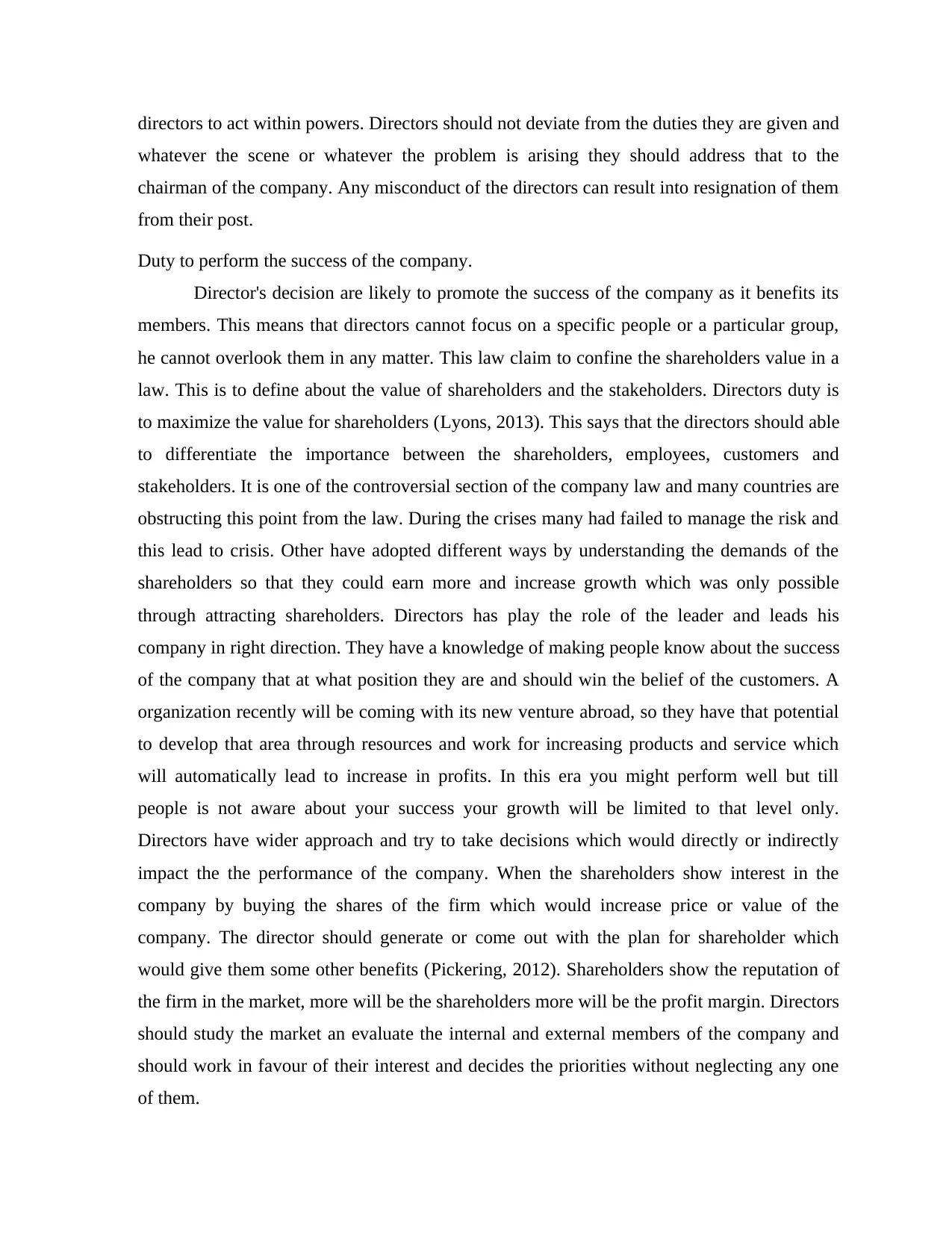
directors to act within powers. Directors should not deviate from the duties they are given and
whatever the scene or whatever the problem is arising they should address that to the
chairman of the company. Any misconduct of the directors can result into resignation of them
from their post.
Duty to perform the success of the company.
Director's decision are likely to promote the success of the company as it benefits its
members. This means that directors cannot focus on a specific people or a particular group,
he cannot overlook them in any matter. This law claim to confine the shareholders value in a
law. This is to define about the value of shareholders and the stakeholders. Directors duty is
to maximize the value for shareholders (Lyons, 2013). This says that the directors should able
to differentiate the importance between the shareholders, employees, customers and
stakeholders. It is one of the controversial section of the company law and many countries are
obstructing this point from the law. During the crises many had failed to manage the risk and
this lead to crisis. Other have adopted different ways by understanding the demands of the
shareholders so that they could earn more and increase growth which was only possible
through attracting shareholders. Directors has play the role of the leader and leads his
company in right direction. They have a knowledge of making people know about the success
of the company that at what position they are and should win the belief of the customers. A
organization recently will be coming with its new venture abroad, so they have that potential
to develop that area through resources and work for increasing products and service which
will automatically lead to increase in profits. In this era you might perform well but till
people is not aware about your success your growth will be limited to that level only.
Directors have wider approach and try to take decisions which would directly or indirectly
impact the the performance of the company. When the shareholders show interest in the
company by buying the shares of the firm which would increase price or value of the
company. The director should generate or come out with the plan for shareholder which
would give them some other benefits (Pickering, 2012). Shareholders show the reputation of
the firm in the market, more will be the shareholders more will be the profit margin. Directors
should study the market an evaluate the internal and external members of the company and
should work in favour of their interest and decides the priorities without neglecting any one
of them.
whatever the scene or whatever the problem is arising they should address that to the
chairman of the company. Any misconduct of the directors can result into resignation of them
from their post.
Duty to perform the success of the company.
Director's decision are likely to promote the success of the company as it benefits its
members. This means that directors cannot focus on a specific people or a particular group,
he cannot overlook them in any matter. This law claim to confine the shareholders value in a
law. This is to define about the value of shareholders and the stakeholders. Directors duty is
to maximize the value for shareholders (Lyons, 2013). This says that the directors should able
to differentiate the importance between the shareholders, employees, customers and
stakeholders. It is one of the controversial section of the company law and many countries are
obstructing this point from the law. During the crises many had failed to manage the risk and
this lead to crisis. Other have adopted different ways by understanding the demands of the
shareholders so that they could earn more and increase growth which was only possible
through attracting shareholders. Directors has play the role of the leader and leads his
company in right direction. They have a knowledge of making people know about the success
of the company that at what position they are and should win the belief of the customers. A
organization recently will be coming with its new venture abroad, so they have that potential
to develop that area through resources and work for increasing products and service which
will automatically lead to increase in profits. In this era you might perform well but till
people is not aware about your success your growth will be limited to that level only.
Directors have wider approach and try to take decisions which would directly or indirectly
impact the the performance of the company. When the shareholders show interest in the
company by buying the shares of the firm which would increase price or value of the
company. The director should generate or come out with the plan for shareholder which
would give them some other benefits (Pickering, 2012). Shareholders show the reputation of
the firm in the market, more will be the shareholders more will be the profit margin. Directors
should study the market an evaluate the internal and external members of the company and
should work in favour of their interest and decides the priorities without neglecting any one
of them.
Paraphrase This Document
Need a fresh take? Get an instant paraphrase of this document with our AI Paraphraser
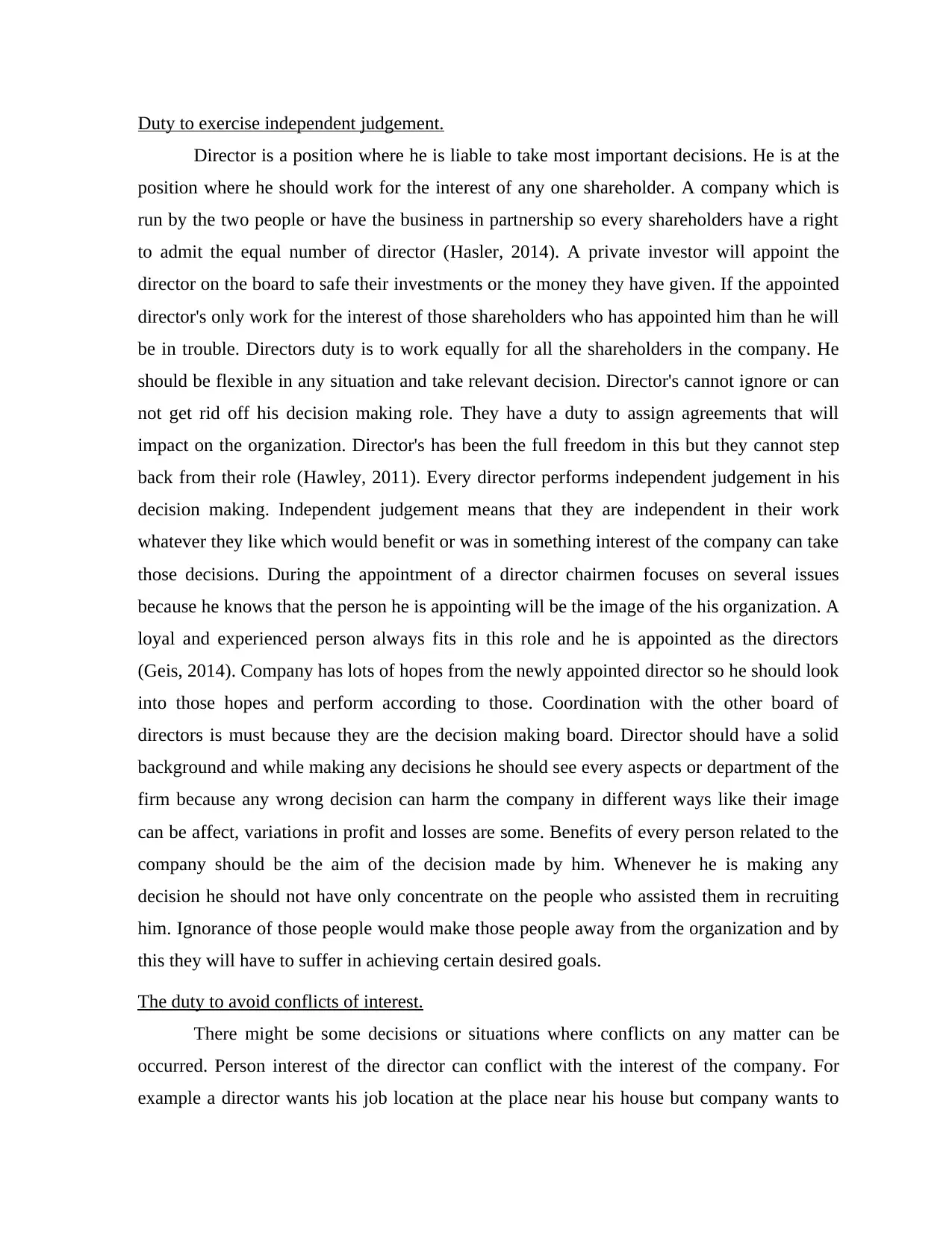
Duty to exercise independent judgement.
Director is a position where he is liable to take most important decisions. He is at the
position where he should work for the interest of any one shareholder. A company which is
run by the two people or have the business in partnership so every shareholders have a right
to admit the equal number of director (Hasler, 2014). A private investor will appoint the
director on the board to safe their investments or the money they have given. If the appointed
director's only work for the interest of those shareholders who has appointed him than he will
be in trouble. Directors duty is to work equally for all the shareholders in the company. He
should be flexible in any situation and take relevant decision. Director's cannot ignore or can
not get rid off his decision making role. They have a duty to assign agreements that will
impact on the organization. Director's has been the full freedom in this but they cannot step
back from their role (Hawley, 2011). Every director performs independent judgement in his
decision making. Independent judgement means that they are independent in their work
whatever they like which would benefit or was in something interest of the company can take
those decisions. During the appointment of a director chairmen focuses on several issues
because he knows that the person he is appointing will be the image of the his organization. A
loyal and experienced person always fits in this role and he is appointed as the directors
(Geis, 2014). Company has lots of hopes from the newly appointed director so he should look
into those hopes and perform according to those. Coordination with the other board of
directors is must because they are the decision making board. Director should have a solid
background and while making any decisions he should see every aspects or department of the
firm because any wrong decision can harm the company in different ways like their image
can be affect, variations in profit and losses are some. Benefits of every person related to the
company should be the aim of the decision made by him. Whenever he is making any
decision he should not have only concentrate on the people who assisted them in recruiting
him. Ignorance of those people would make those people away from the organization and by
this they will have to suffer in achieving certain desired goals.
The duty to avoid conflicts of interest.
There might be some decisions or situations where conflicts on any matter can be
occurred. Person interest of the director can conflict with the interest of the company. For
example a director wants his job location at the place near his house but company wants to
Director is a position where he is liable to take most important decisions. He is at the
position where he should work for the interest of any one shareholder. A company which is
run by the two people or have the business in partnership so every shareholders have a right
to admit the equal number of director (Hasler, 2014). A private investor will appoint the
director on the board to safe their investments or the money they have given. If the appointed
director's only work for the interest of those shareholders who has appointed him than he will
be in trouble. Directors duty is to work equally for all the shareholders in the company. He
should be flexible in any situation and take relevant decision. Director's cannot ignore or can
not get rid off his decision making role. They have a duty to assign agreements that will
impact on the organization. Director's has been the full freedom in this but they cannot step
back from their role (Hawley, 2011). Every director performs independent judgement in his
decision making. Independent judgement means that they are independent in their work
whatever they like which would benefit or was in something interest of the company can take
those decisions. During the appointment of a director chairmen focuses on several issues
because he knows that the person he is appointing will be the image of the his organization. A
loyal and experienced person always fits in this role and he is appointed as the directors
(Geis, 2014). Company has lots of hopes from the newly appointed director so he should look
into those hopes and perform according to those. Coordination with the other board of
directors is must because they are the decision making board. Director should have a solid
background and while making any decisions he should see every aspects or department of the
firm because any wrong decision can harm the company in different ways like their image
can be affect, variations in profit and losses are some. Benefits of every person related to the
company should be the aim of the decision made by him. Whenever he is making any
decision he should not have only concentrate on the people who assisted them in recruiting
him. Ignorance of those people would make those people away from the organization and by
this they will have to suffer in achieving certain desired goals.
The duty to avoid conflicts of interest.
There might be some decisions or situations where conflicts on any matter can be
occurred. Person interest of the director can conflict with the interest of the company. For
example a director wants his job location at the place near his house but company wants to
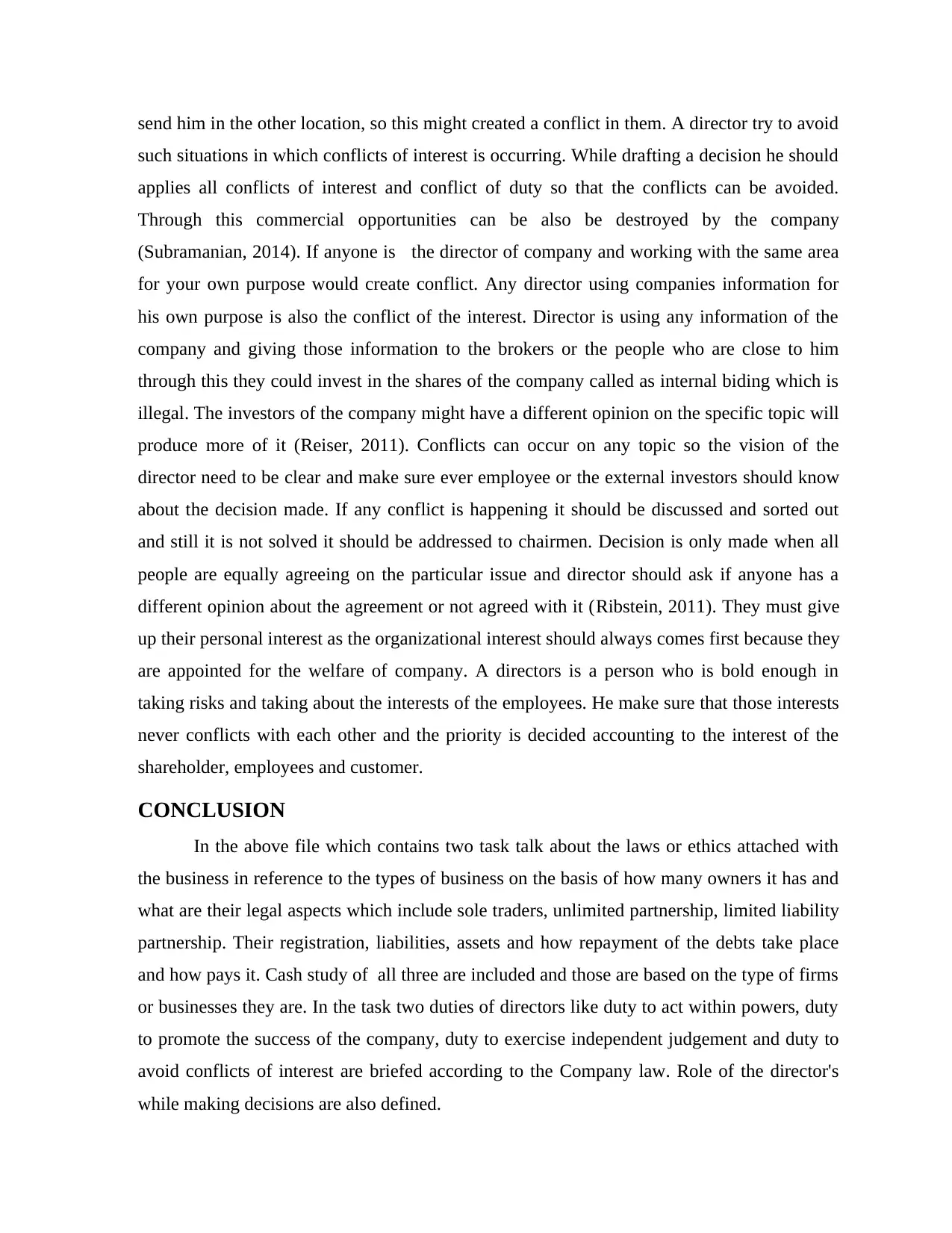
send him in the other location, so this might created a conflict in them. A director try to avoid
such situations in which conflicts of interest is occurring. While drafting a decision he should
applies all conflicts of interest and conflict of duty so that the conflicts can be avoided.
Through this commercial opportunities can be also be destroyed by the company
(Subramanian, 2014). If anyone is the director of company and working with the same area
for your own purpose would create conflict. Any director using companies information for
his own purpose is also the conflict of the interest. Director is using any information of the
company and giving those information to the brokers or the people who are close to him
through this they could invest in the shares of the company called as internal biding which is
illegal. The investors of the company might have a different opinion on the specific topic will
produce more of it (Reiser, 2011). Conflicts can occur on any topic so the vision of the
director need to be clear and make sure ever employee or the external investors should know
about the decision made. If any conflict is happening it should be discussed and sorted out
and still it is not solved it should be addressed to chairmen. Decision is only made when all
people are equally agreeing on the particular issue and director should ask if anyone has a
different opinion about the agreement or not agreed with it (Ribstein, 2011). They must give
up their personal interest as the organizational interest should always comes first because they
are appointed for the welfare of company. A directors is a person who is bold enough in
taking risks and taking about the interests of the employees. He make sure that those interests
never conflicts with each other and the priority is decided accounting to the interest of the
shareholder, employees and customer.
CONCLUSION
In the above file which contains two task talk about the laws or ethics attached with
the business in reference to the types of business on the basis of how many owners it has and
what are their legal aspects which include sole traders, unlimited partnership, limited liability
partnership. Their registration, liabilities, assets and how repayment of the debts take place
and how pays it. Cash study of all three are included and those are based on the type of firms
or businesses they are. In the task two duties of directors like duty to act within powers, duty
to promote the success of the company, duty to exercise independent judgement and duty to
avoid conflicts of interest are briefed according to the Company law. Role of the director's
while making decisions are also defined.
such situations in which conflicts of interest is occurring. While drafting a decision he should
applies all conflicts of interest and conflict of duty so that the conflicts can be avoided.
Through this commercial opportunities can be also be destroyed by the company
(Subramanian, 2014). If anyone is the director of company and working with the same area
for your own purpose would create conflict. Any director using companies information for
his own purpose is also the conflict of the interest. Director is using any information of the
company and giving those information to the brokers or the people who are close to him
through this they could invest in the shares of the company called as internal biding which is
illegal. The investors of the company might have a different opinion on the specific topic will
produce more of it (Reiser, 2011). Conflicts can occur on any topic so the vision of the
director need to be clear and make sure ever employee or the external investors should know
about the decision made. If any conflict is happening it should be discussed and sorted out
and still it is not solved it should be addressed to chairmen. Decision is only made when all
people are equally agreeing on the particular issue and director should ask if anyone has a
different opinion about the agreement or not agreed with it (Ribstein, 2011). They must give
up their personal interest as the organizational interest should always comes first because they
are appointed for the welfare of company. A directors is a person who is bold enough in
taking risks and taking about the interests of the employees. He make sure that those interests
never conflicts with each other and the priority is decided accounting to the interest of the
shareholder, employees and customer.
CONCLUSION
In the above file which contains two task talk about the laws or ethics attached with
the business in reference to the types of business on the basis of how many owners it has and
what are their legal aspects which include sole traders, unlimited partnership, limited liability
partnership. Their registration, liabilities, assets and how repayment of the debts take place
and how pays it. Cash study of all three are included and those are based on the type of firms
or businesses they are. In the task two duties of directors like duty to act within powers, duty
to promote the success of the company, duty to exercise independent judgement and duty to
avoid conflicts of interest are briefed according to the Company law. Role of the director's
while making decisions are also defined.
⊘ This is a preview!⊘
Do you want full access?
Subscribe today to unlock all pages.

Trusted by 1+ million students worldwide
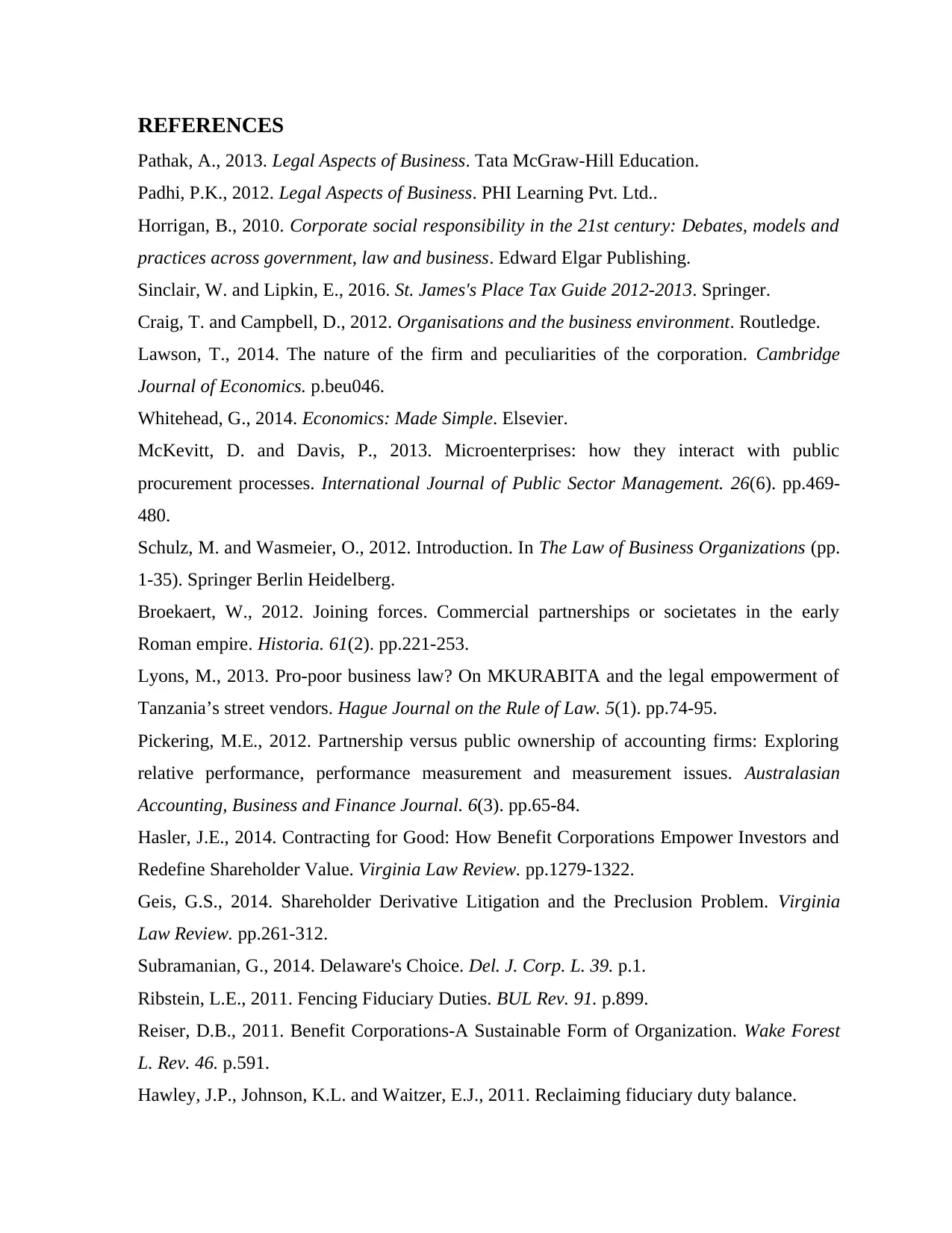
REFERENCES
Pathak, A., 2013. Legal Aspects of Business. Tata McGraw-Hill Education.
Padhi, P.K., 2012. Legal Aspects of Business. PHI Learning Pvt. Ltd..
Horrigan, B., 2010. Corporate social responsibility in the 21st century: Debates, models and
practices across government, law and business. Edward Elgar Publishing.
Sinclair, W. and Lipkin, E., 2016. St. James's Place Tax Guide 2012-2013. Springer.
Craig, T. and Campbell, D., 2012. Organisations and the business environment. Routledge.
Lawson, T., 2014. The nature of the firm and peculiarities of the corporation. Cambridge
Journal of Economics. p.beu046.
Whitehead, G., 2014. Economics: Made Simple. Elsevier.
McKevitt, D. and Davis, P., 2013. Microenterprises: how they interact with public
procurement processes. International Journal of Public Sector Management. 26(6). pp.469-
480.
Schulz, M. and Wasmeier, O., 2012. Introduction. In The Law of Business Organizations (pp.
1-35). Springer Berlin Heidelberg.
Broekaert, W., 2012. Joining forces. Commercial partnerships or societates in the early
Roman empire. Historia. 61(2). pp.221-253.
Lyons, M., 2013. Pro-poor business law? On MKURABITA and the legal empowerment of
Tanzania’s street vendors. Hague Journal on the Rule of Law. 5(1). pp.74-95.
Pickering, M.E., 2012. Partnership versus public ownership of accounting firms: Exploring
relative performance, performance measurement and measurement issues. Australasian
Accounting, Business and Finance Journal. 6(3). pp.65-84.
Hasler, J.E., 2014. Contracting for Good: How Benefit Corporations Empower Investors and
Redefine Shareholder Value. Virginia Law Review. pp.1279-1322.
Geis, G.S., 2014. Shareholder Derivative Litigation and the Preclusion Problem. Virginia
Law Review. pp.261-312.
Subramanian, G., 2014. Delaware's Choice. Del. J. Corp. L. 39. p.1.
Ribstein, L.E., 2011. Fencing Fiduciary Duties. BUL Rev. 91. p.899.
Reiser, D.B., 2011. Benefit Corporations-A Sustainable Form of Organization. Wake Forest
L. Rev. 46. p.591.
Hawley, J.P., Johnson, K.L. and Waitzer, E.J., 2011. Reclaiming fiduciary duty balance.
Pathak, A., 2013. Legal Aspects of Business. Tata McGraw-Hill Education.
Padhi, P.K., 2012. Legal Aspects of Business. PHI Learning Pvt. Ltd..
Horrigan, B., 2010. Corporate social responsibility in the 21st century: Debates, models and
practices across government, law and business. Edward Elgar Publishing.
Sinclair, W. and Lipkin, E., 2016. St. James's Place Tax Guide 2012-2013. Springer.
Craig, T. and Campbell, D., 2012. Organisations and the business environment. Routledge.
Lawson, T., 2014. The nature of the firm and peculiarities of the corporation. Cambridge
Journal of Economics. p.beu046.
Whitehead, G., 2014. Economics: Made Simple. Elsevier.
McKevitt, D. and Davis, P., 2013. Microenterprises: how they interact with public
procurement processes. International Journal of Public Sector Management. 26(6). pp.469-
480.
Schulz, M. and Wasmeier, O., 2012. Introduction. In The Law of Business Organizations (pp.
1-35). Springer Berlin Heidelberg.
Broekaert, W., 2012. Joining forces. Commercial partnerships or societates in the early
Roman empire. Historia. 61(2). pp.221-253.
Lyons, M., 2013. Pro-poor business law? On MKURABITA and the legal empowerment of
Tanzania’s street vendors. Hague Journal on the Rule of Law. 5(1). pp.74-95.
Pickering, M.E., 2012. Partnership versus public ownership of accounting firms: Exploring
relative performance, performance measurement and measurement issues. Australasian
Accounting, Business and Finance Journal. 6(3). pp.65-84.
Hasler, J.E., 2014. Contracting for Good: How Benefit Corporations Empower Investors and
Redefine Shareholder Value. Virginia Law Review. pp.1279-1322.
Geis, G.S., 2014. Shareholder Derivative Litigation and the Preclusion Problem. Virginia
Law Review. pp.261-312.
Subramanian, G., 2014. Delaware's Choice. Del. J. Corp. L. 39. p.1.
Ribstein, L.E., 2011. Fencing Fiduciary Duties. BUL Rev. 91. p.899.
Reiser, D.B., 2011. Benefit Corporations-A Sustainable Form of Organization. Wake Forest
L. Rev. 46. p.591.
Hawley, J.P., Johnson, K.L. and Waitzer, E.J., 2011. Reclaiming fiduciary duty balance.
Paraphrase This Document
Need a fresh take? Get an instant paraphrase of this document with our AI Paraphraser
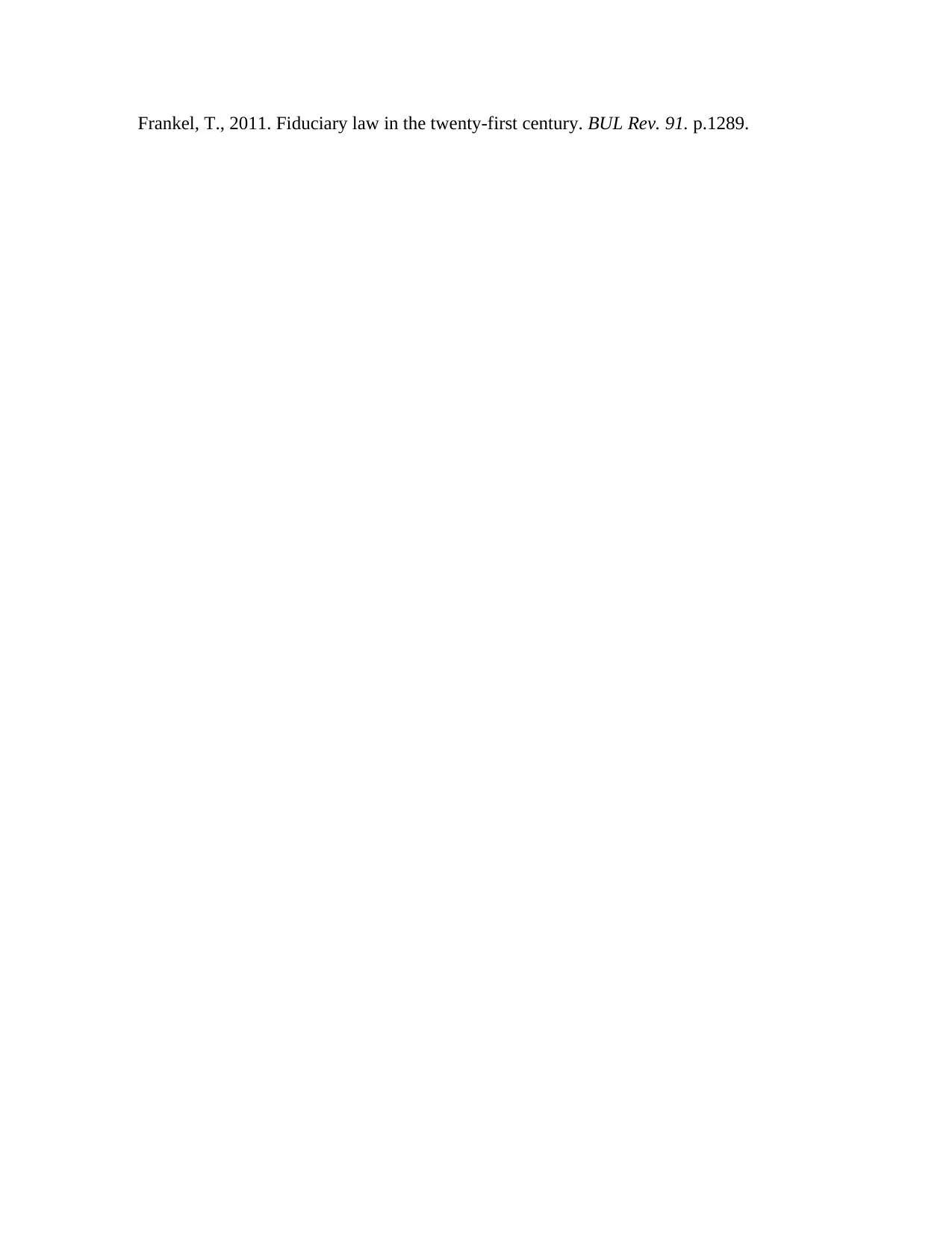
Frankel, T., 2011. Fiduciary law in the twenty-first century. BUL Rev. 91. p.1289.
1 out of 11
Related Documents
Your All-in-One AI-Powered Toolkit for Academic Success.
+13062052269
info@desklib.com
Available 24*7 on WhatsApp / Email
![[object Object]](/_next/static/media/star-bottom.7253800d.svg)
Unlock your academic potential
Copyright © 2020–2025 A2Z Services. All Rights Reserved. Developed and managed by ZUCOL.



